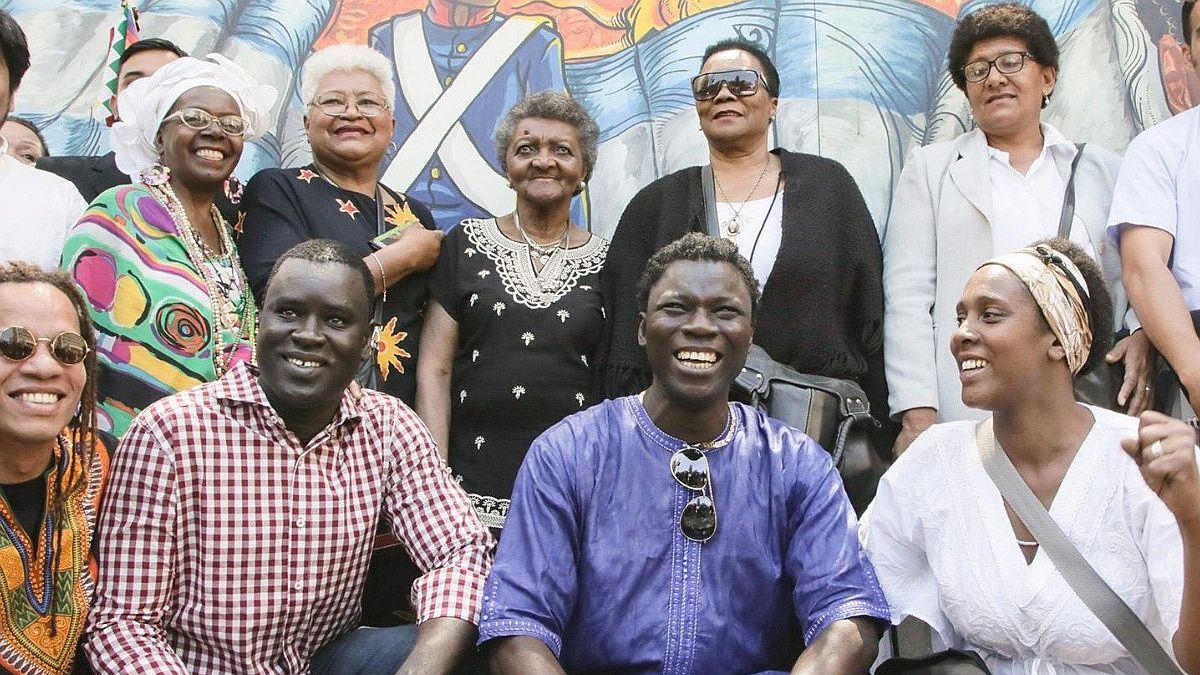Preta Hub afro-entrepreneurship
One of the main findings of the survey is the predominance of women in the afro-business ecosystem: They represent 80% of the people surveyed. And as expected, they are also the ones that face substantial challenges in terms of income: 48% of businesses led by women have income of up to one minimum wage. Despite this, many of these businesses play a crucial role in the economic support of families, since 59% of the businesses generate the sole or main income of the household.
Adriana Barbosaexecutive director of Feira Preta Institute and the only Brazilian recognized by the TIME magazine among the 18 prominent global leaders in the racial labor market, considered that these surveys allow “understand how to value the traditional knowledge of these populations to generate income and thus promote social and economic mobility.”
Adriana Barbosa Feira Preta Institute.jpg

“The contributions of Afro-entrepreneurs in the results of the study, Bermúdez added, are absolutely remarkablewhich gives us great confidence to affirm that black and Latino Afro-entrepreneurship is also feminine. In this sense, everything that is proposed based on this data must have a strong gender focus or intentionality.”
Afropreneurs: self-esteem and identification
Argentina has a population of 46 million people, of which 303,000 are recognized as Afro-descendants. (0.7% of the population). According to the study, this group has a majority of the active population (73.3%) and also represents the largest occupation in the labor market (73% vs 63.6% of the population).
An interesting point revealed by the study is that Afropreneurs have great confidence in the quality of their products and services. Around 59% of Argentines surveyed express high confidence in their ability to produce high-quality products or services.a figure that remains the same when it comes to your confidence in selling those products or services.
“The trust of Afro-entrepreneurs in their creations, whether products or services, and also in how they structure their businesses is essential, because in addition to reinforcing a cultural identity, they definitively establish a specific consumer market, often challenging stereotypes and prejudices that can negatively affect the perception that the market has of companies led by people of African descent,” commented the director of Fair Preta.
The investigation also showed that there is a greater insecurity regarding the ability to create and strengthen partner networks. Only 35% of people surveyed feel very confident in their ability to create partnerships to run their business. When taking risks, 46% feel very confident.
image.png

Regarding the commitment to racial issues, 89% of people interviewed believe that companies should get involved. Additionally, they consider their business to be an anti-racist endeavor.
“The belief that companies should engage in racial issues suggests that African entrepreneurship obviously wants to make profits, but it is not limited to that, as it also aims to play an active role in social transformation. The anti-racist approach shows that these Companies are aware of structural inequalities and try to combat them by aligning their values with business practice,” underlines Eddy Bermúdez.
According to the study, companies are considered anti-racist not only for their stated intentions, but also for their practices: They are run by black people and serve primarily non-white customers. “This indicates that, in addition to creating opportunities for economic inclusion, these initiatives contribute to the creation of spaces of consumption and belonging, reinforcing identities and communities that have historically been marginalized,” the work stressed.
“This Afro-entrepreneurial identity is also reflected in the firm commitment to improving the living conditions of the Afro community, whether through products and services that satisfy specific needs or the valorization of cultural practices,” he concluded.
Profile of Afro-entrepreneurships in Argentina
As debates around racial and immigration issues have advanced, discussions about exclusion and about a national identity formed from limited references to non-black populations have expanded. For this reason, the organizers of the survey assured that the main challenge within this market is to recognize and support them. 62% believe that businesses should be concerned about racial issues, since most entrepreneurs consider their businesses to be related to these issues.
Furthermore, the study revealed that 56% of Afro-Argentine people are concentrated in the metropolitan region and the province of Buenos Aires. Despite the difficulties, they present some basic indicators better than those of the general population.
In Argentina (and Brazil) 47% of entrepreneurs have a secondary level of education; 26% technical education, and 21% university. In that sense, it was known that 6 in 10 feel great confidence in their ability and ability to produce and sell high-quality products or services; and that 46% feel confident and brave to take risks or face challenges.
image.png

Regarding the professional self-identification, Argentine Afro-entrepreneurs (and also Panamanians) are the ones who most identify with a role of “entrepreneurs”while in other countries they are defined as self-employed or independent workers.
By breaking down the characteristics of the ventures, it was known that 37% of Argentine Afro-entrepreneurs are between 30 and 39 years oldthe majority being sole proprietorships (58% work alone, 19% have partners, 20% have formal contracts and 15% have informal help).
At the same time, in Argentina the association between business and racial identity is less common than in the rest of the countries. 47% identify as non-white (black or indigenous), 23% comment that their clients are mostly non-white and 8% prioritize non-white suppliers. 36% suffered racial discrimination from their clients.
How much do Afropreneurs earn per month?
Business income is even more central for women entrepreneurs. Women-led businesses tend to be more important as the main source of household income. The concern to have a positive impact on their businesses, preferring to guarantee the salaries of other collaborators rather than their own, is more common in businesses led by women.
48% of the ventures led by women bill up to 1 minimum wage, while only 36% of the ventures are led by men. In the country, as of November 1, 2024, the minimum, vital and mobile wage (SMVyM) in Argentina it is $271,571.22.
What are the main areas where they work?
The main activities that stand out are: clothing and accessories retailers, restaurants, food, technology services, consulting, transportation, beauty and hairdressing.
The main challenges that Afro-entrepreneurs encounter in their businesses are: 58% seek to expand the number of clients, 47% seek stability in their income, while 27% yearn to enter new markets and sell to large companies, and 18% obtain credit to expand the business (7 out of 10 entrepreneurs have already requested some type of loan to use in the business).
A relevant fact to highlight is that Argentina has the lowest rate of business formalization (only 45% are formalized) compared to other countries, and this is due to the costs associated with the formalization process, as well as the difficulties they encounter in navigating state bureaucracies.
Summary of the study on Argentine Afropreneurs
- 62% of Afro-Argentinian people believe that businesses should be concerned about racial issues.
- 59% are confident in their ability to produce high-quality products or services.
- The same percentage believes in their ability to sell their products.
- 46% are confident in their business decisions.
- Most companies are run by women up to 39 years old
- 48% of businesses led by women generate income of up to a minimum wage.
- Almost 90% of people believe that companies should get involved in racial issues, as they perceive their business as an anti-racist endeavor.
What are the challenges: finances and banking environment
The survey of CAF, Fair Preta and CDE plan, the social impact company established in 2009 by a group of economists, sociologists and anthropologists, highlighted access to financial systemone of the biggest challenges that Afro-entrepreneurs face.
Although the majority of people surveyed are banked, 64% of entrepreneurs use the same account for personal and business purposes. In fact, Access to credit is the main bottleneck. The three main factors contributing to this difficulty are: excessive bureaucracy, the high cost of loans and, above all, racial discrimination.
Afro ATM.jpg

An example of these exclusionary practices was recorded in neighboring countries. The study revealed that 44% of Afro-entrepreneurs in Brazil had their credit applications deniedwhile among brown people this rate is 35% and among white people it is 29%. “This situation leads many Afro-entrepreneurs to resort to informal sources of credit, such as friends, family or even productive microcredits, which reinforces the structural financial exclusion that this population faces,” they warned.
To solve this financial marginalization, Brazilian Afro-entrepreneurs prefer to extend the limits of their credit cards to finance their businesses, while Argentinian women seek loans from non-banking agents. In turn, those in Colombia, Peru and Panama resort more to family loans or microcredits.
Source: Ambito




